Charles E W Bean, Diaries, AWM38 3DRL 606/103/1 - March 1918 - Part 2
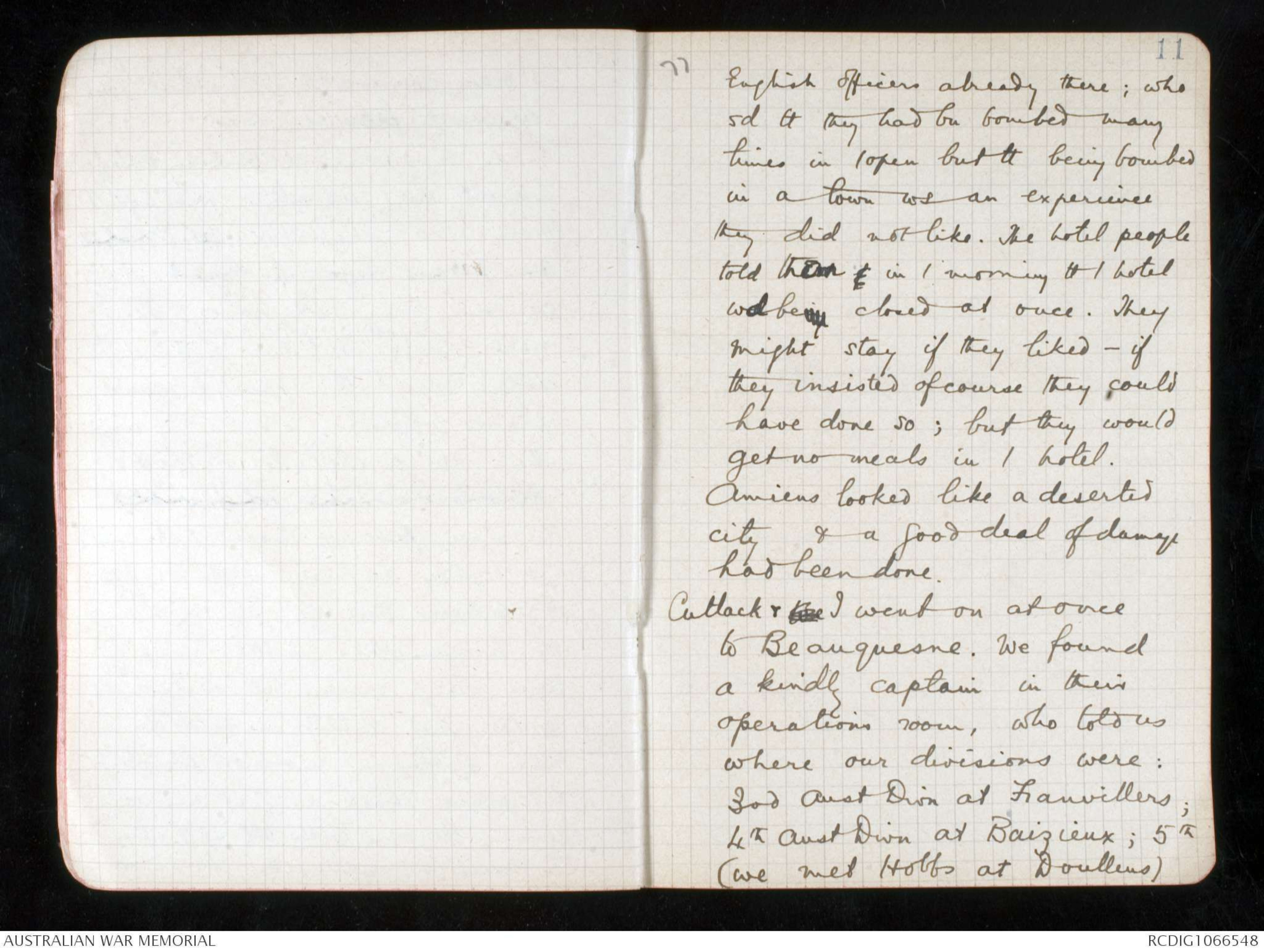
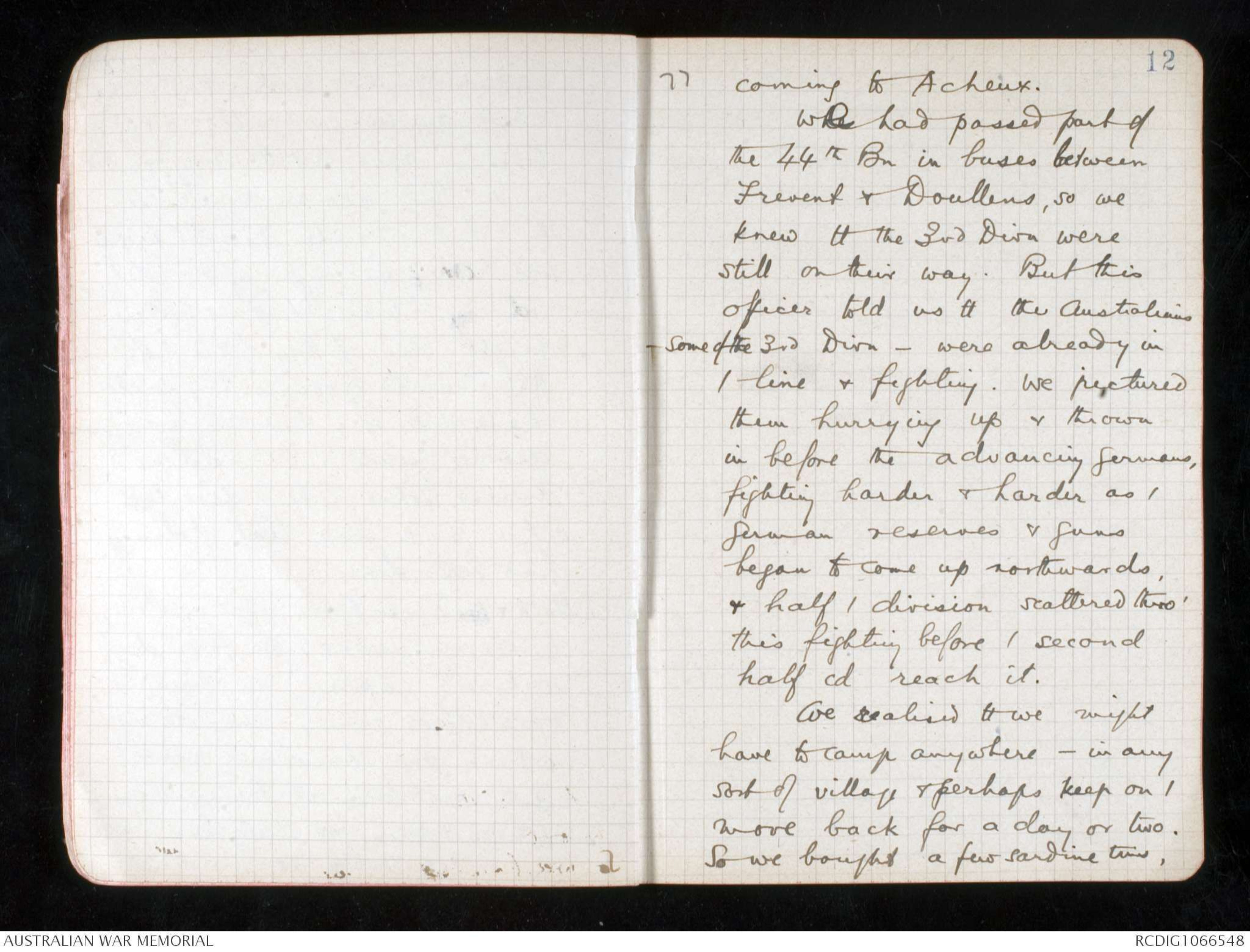
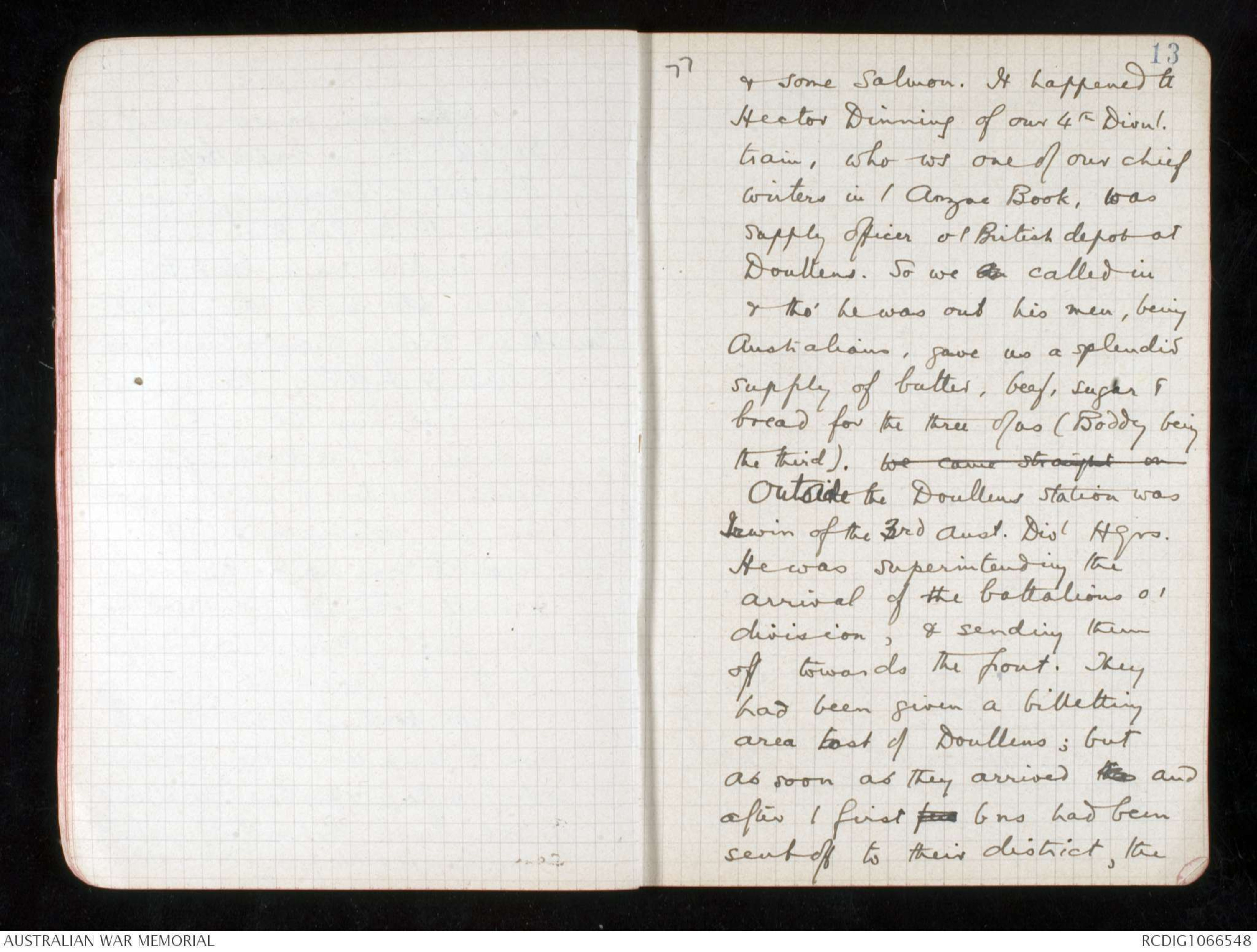
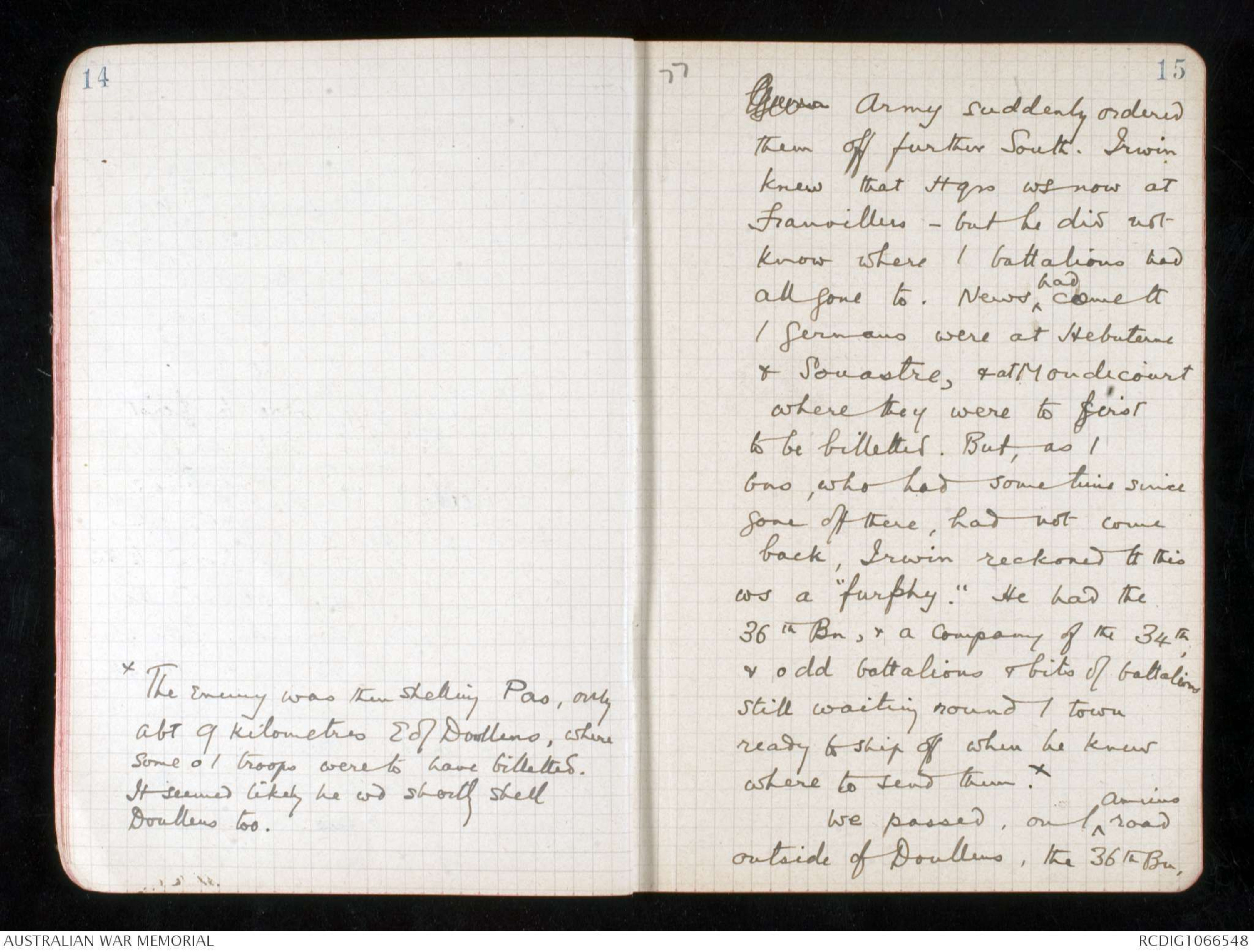
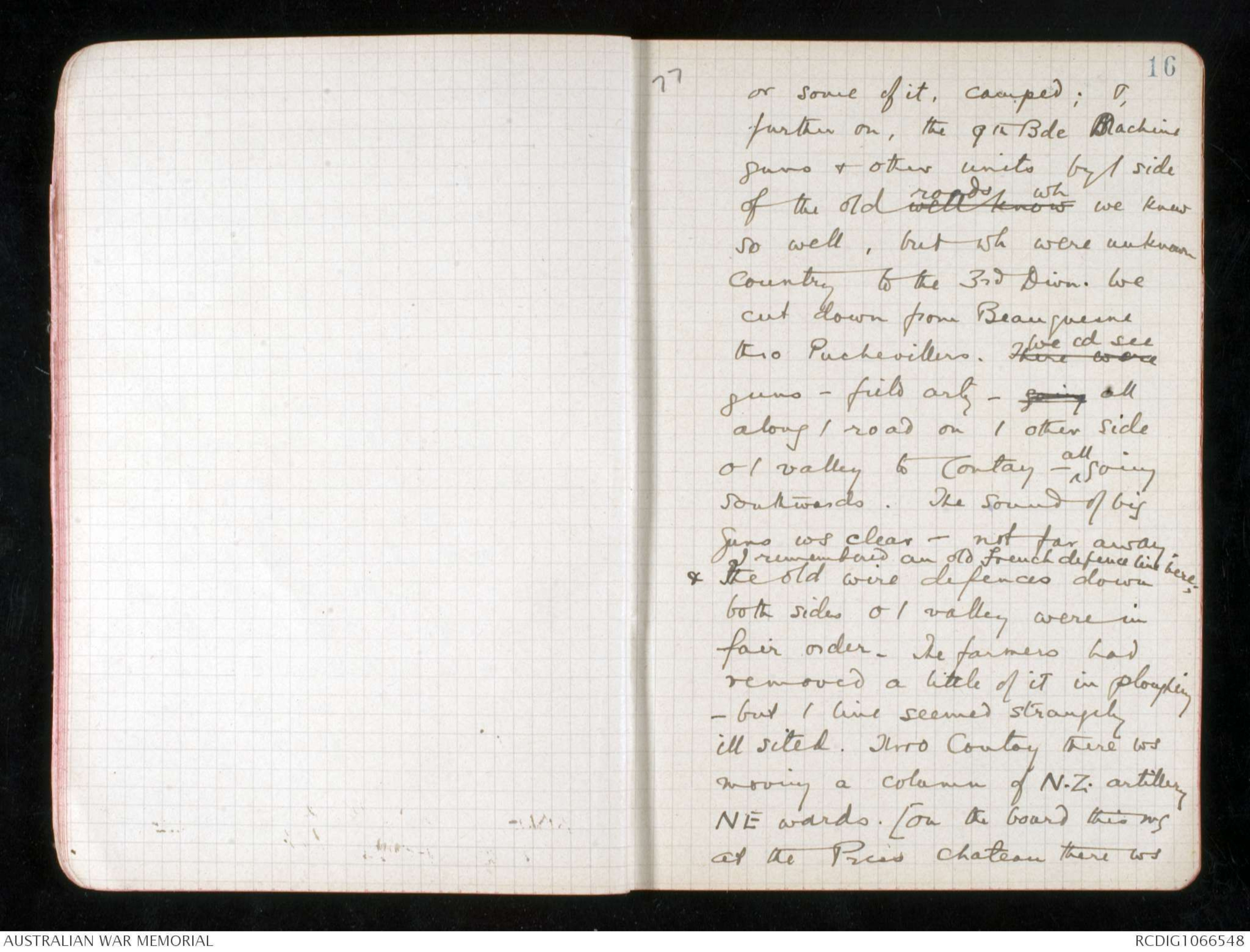
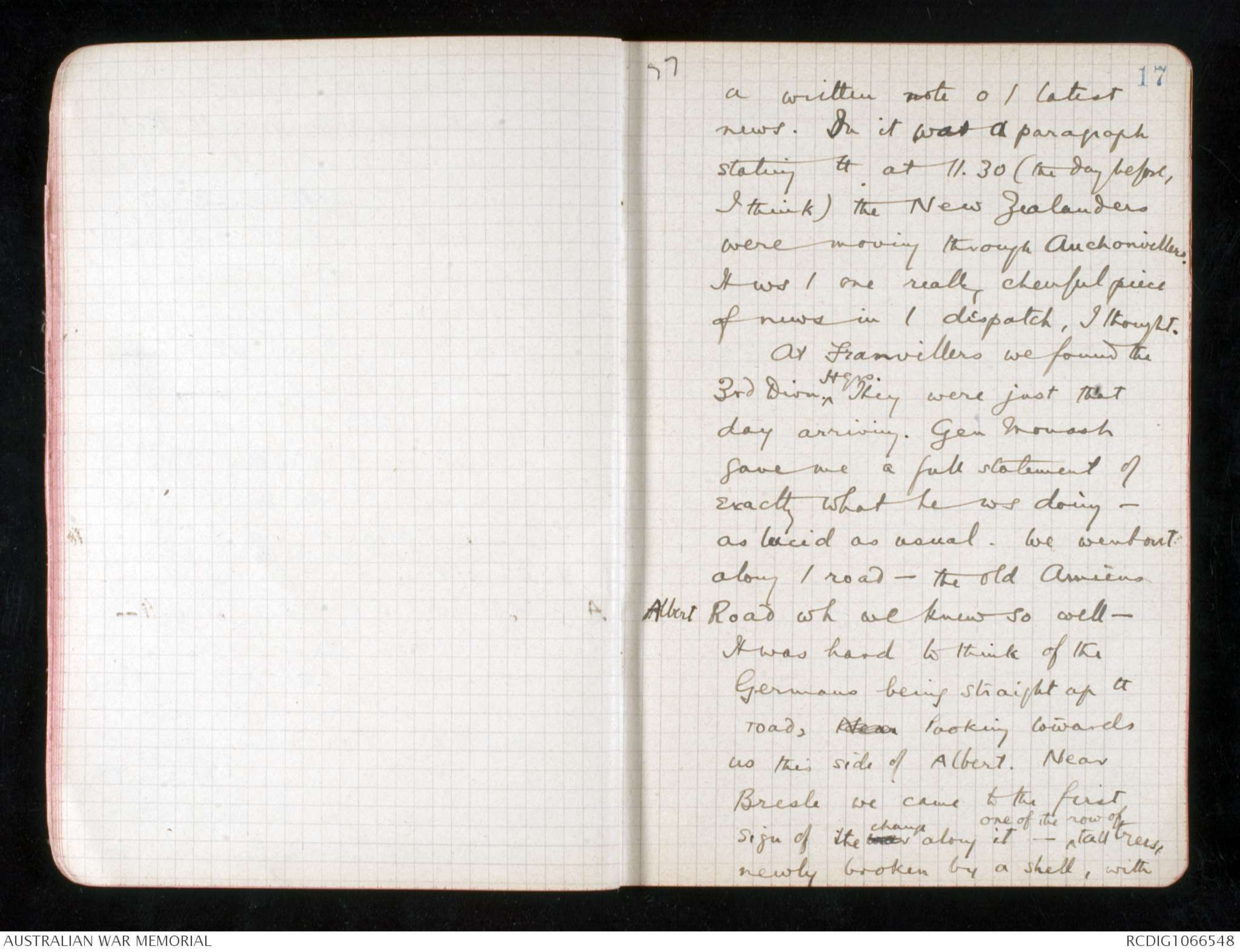
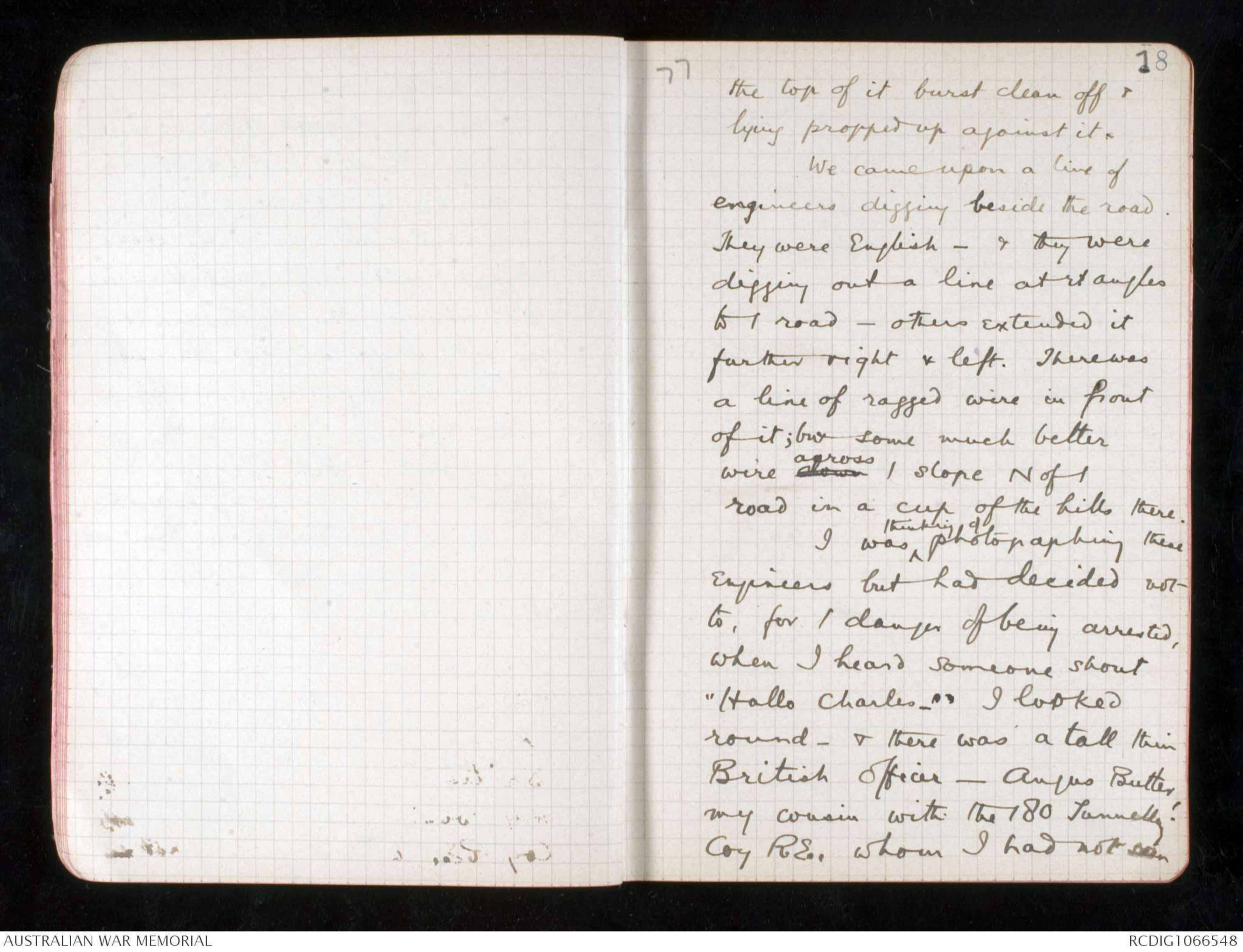
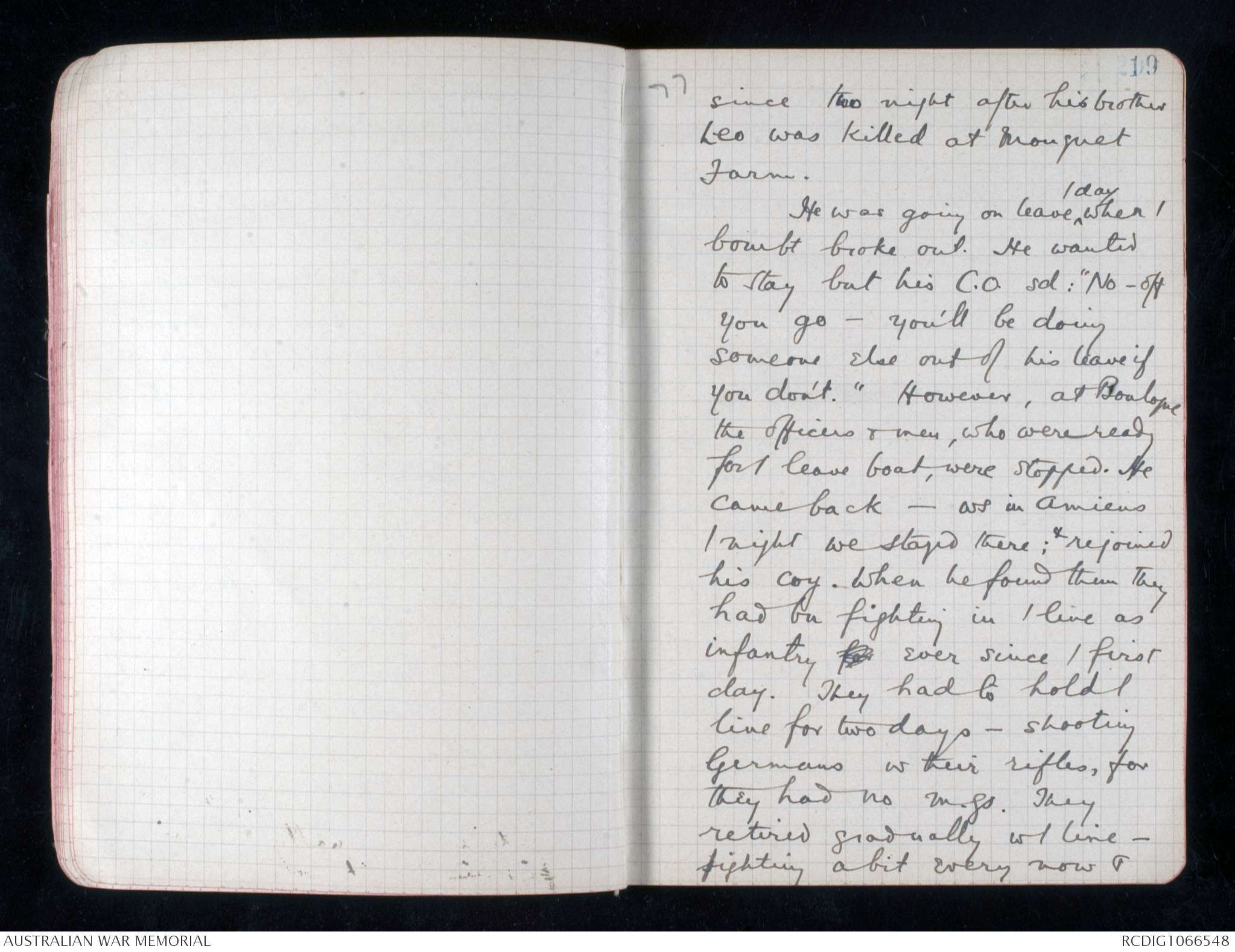
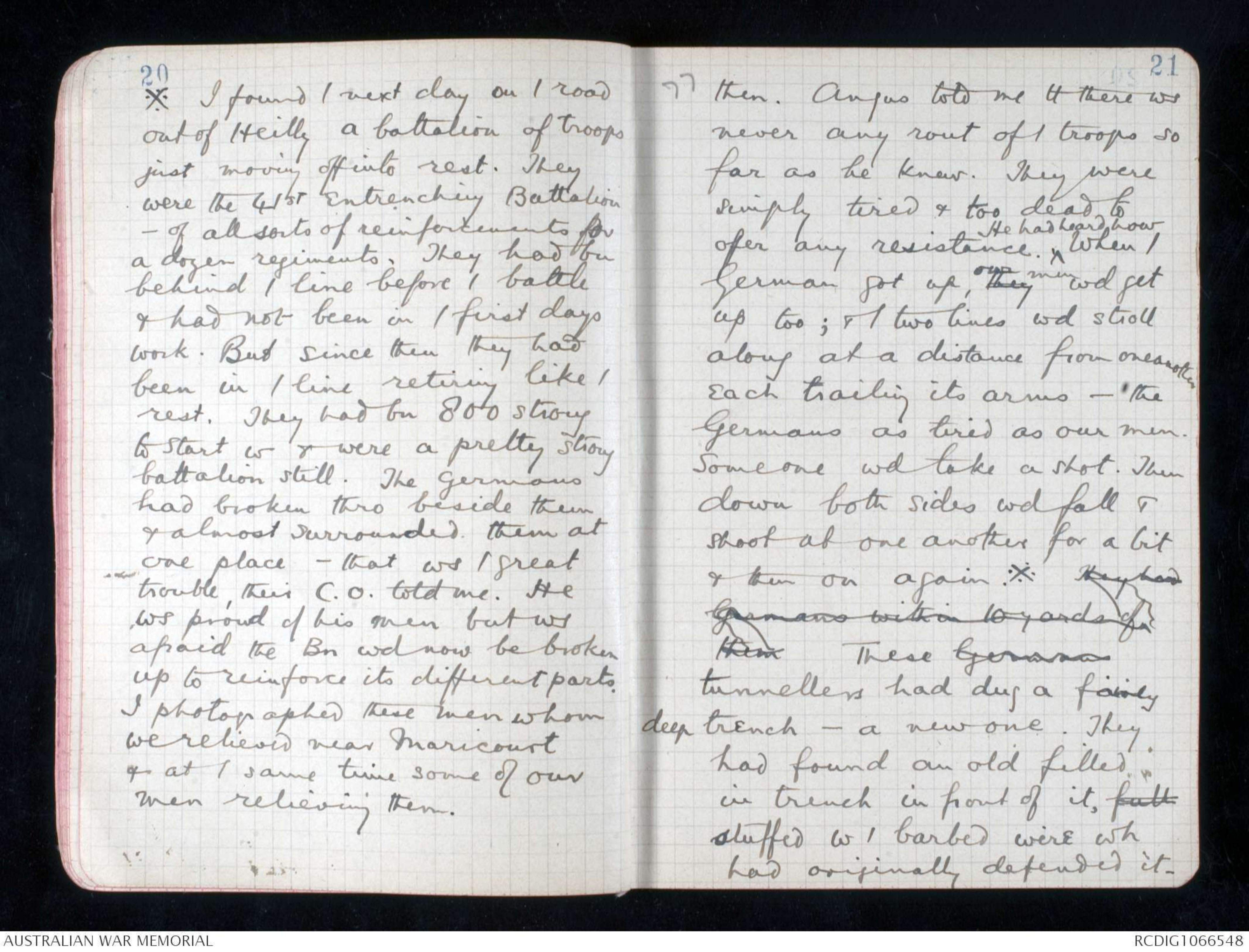
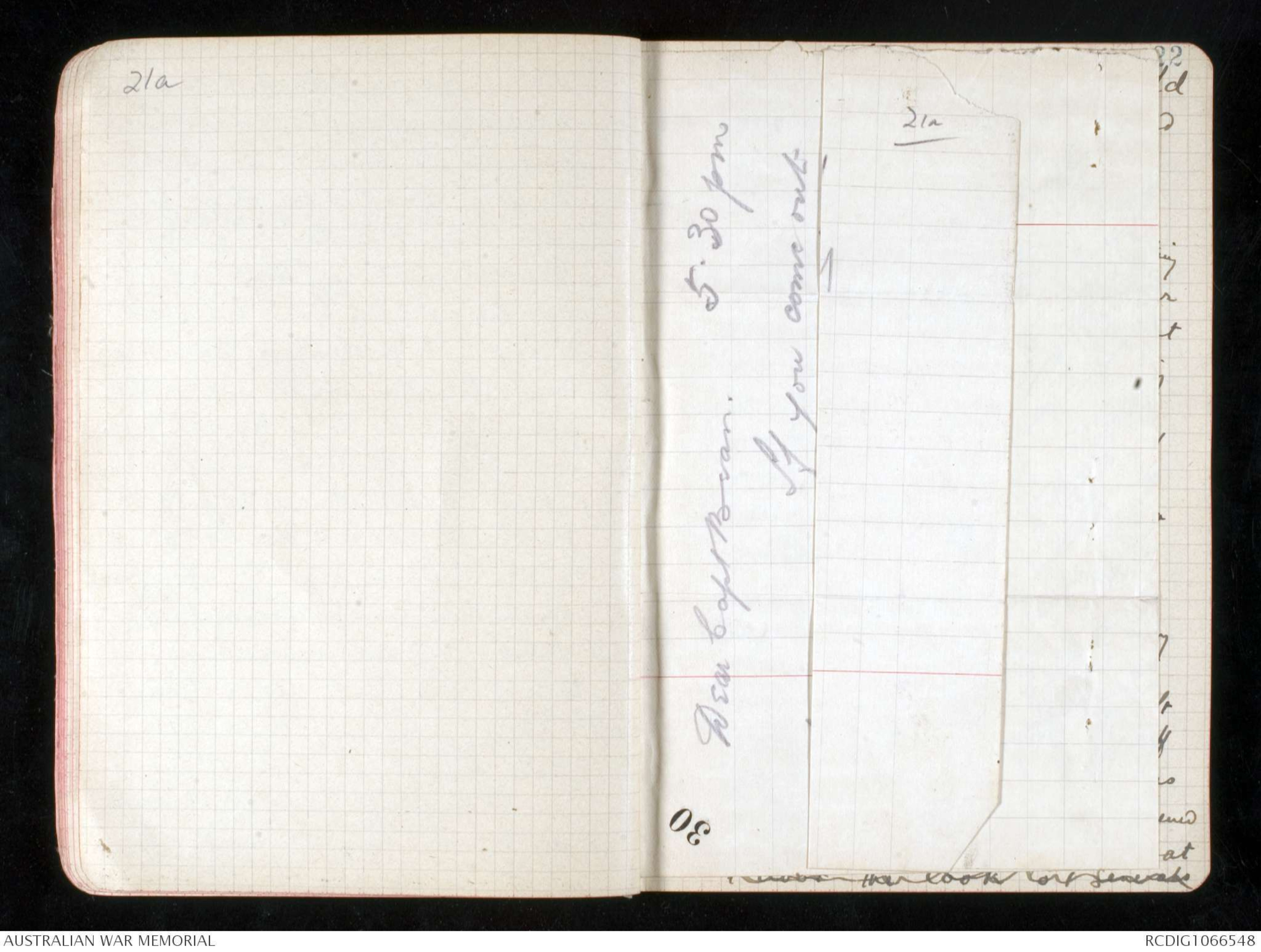
77
11
English officers already there; who
sd tt they had bn bombed many
times in / open but tt being bombed
in a town ws an experience
they did not like. The hotel people
told them x in / morning tt / hotel
wd being closed at once. They
might stay if they liked - if
they insisted of course they could
have done so; but they would
get no meals in / hotel.
Amiens looked like a deserted
city & a good deal of damage
had been done.
Cutlack & We I went on at once
to Beauquesne. We found
a kindly captain in their
operations room, who told us
where our divisions were:
3rd Aust Divn at Franvillers;
4th Aust Divn at Baizieux; 5th
(we met Hobbs at Doullens)
77
12
coming to Acheux.
We had passed part of
the 44th Bn in buses between
Frevent & Doullens, so we
knew tt the 3rd Divn were
still on their way. But this
officer told us tt the Australians
- some of the 3rd Divn - were already in
/ line & fighting. We pictured
them hurrying up & thrown
in before the advancing Germans,
fighting harder & harder as /
German reserves & guns
began to come up northwards,
& half / division scattered thro'
this fighting before / second
half cd reach it.
We realised tt we might
have to camp anywhere - in any
sort of village & perhaps keep on /
move back for a day or two.
So we bought a few sardine tins,
77
13
& some salmon. It happened tt
Hector Dinning of our 4th Divnl.
train, who ws one of our chief
writers in / Anzac Book, was
supply officer o / British depot at
Doullens. So we dr called in
& tho' he was out his men, being
Australians, gave us a splendid
supply of butter, beef, sugar &
bread for the three of us (Boddy being
the third). We came straight on
Outside the Doullens station was
Irwin of the 3rd Aust. Divl Hqrs.
He was superintending the
arrival of the battalions o /
division, & sending them
off towards the front. They
had been given a billetting
area East of Doullens; but
as soon as they arrived the and
after / first few bns had been
sent off to their district, the
14
X The enemy was then shelling Pas, only
abt 9 kilometres E of Doullens, where
some o / troops were to have billetted.
It seemed likely he wd shortly shell
Doullens too.
77
15
Germ Army suddenly ordered
them off further South. Irwin
knew that Hqrs ws now at
Franvillers - but he did not
know where / battalions had
all gone to. News ^had come tt
/ Germans were at Hebuterne
& Souastre, & at Mondicourt
where they were to first
to be billetted. But, as /
bns, who had some time since
gone off there, had not come
back, Irwin reckoned tt this
ws a "furphy." He had the
36th Bn, & a Company of the 34th,
& odd battalions & bits of battalions
still waiting round / town
ready to ship off when he knew
where to send them. X
We passed, on / ^Amiens road
outside of Doullens, the 36th Bn,
77
16
or some of it, camped; &,
further on, the 9th Bde Machine
guns & other units by / side
of the old well know roads wh we knew
so well, but wh were unknown
country to the 3rd Divn. We
cut down from Beauquesne
thro Puchevillers. There were We cd see
guns - field arty - going all
along / road on / other side
o / valley to Contay - ^all going
southwards. The sound of big
guns ws clear - not far away.
I remembered an old French defence line here,
& the old wire defences down
both sides o / valley were in
fair order. The farmers had
removed a little of it in ploughing
- but / line seemed strangely
ill sited. Thro Contay there ws
moving a column of N.Z. artillery
NE wards. [on the board this mg
at the Press Chateau there ws
77
17
a written note o / latest
news. In it was a paragraph
stating tt at 11.30 (the day before,
I think) the New Zealanders
were moving through Auchonvillers.
It ws / one really cheerful piece
of news in / despatch, I thought.
At Franvillers we found the
3rd Divn ^Hqrs. They were just that
day arriving. Gen Monash
gave me a full statement of
exactly what he ws doing -
as lucid as usual. We went out
along / road - the old Amiens
Albert Road wh we knew so well -
It was hard to think of the
Germans being straight up tt
road, Near looking towards
us this side of Albert. Near
Bresle we came to the first
sign of the wa change along it - ^one of the row of tall trees,
newly broken by a shell, with
77
18
the top it burst clean off &
lying propped up against it.
We came upon a line of
engineers digging beside the road.
They were English - & they were
digging out a line at rt angles
to / road - others extended it
further right & left. There was
a line of ragged wire in front
of it; but some much better
wire down across / slope N of /
road in a cup of the hills there.
I was ^thinking of photographing these
engineers but had decided not
to, for / danger of being arrested,
when I heard someone shout
"Hallo Charles." I looked
round - & there was a tall thin
British Officer - Angus Butler,
my cousin with the 180 Tunnelling!
Coy R.E. whom I had not seen
77
19
since the night after his brother
Leo was killed at Mouquet
Farm.
He was going on leave ^/ day when /
bombt broke out. He wanted
to stay but his C.O. sd: "No -off
you go - you'll be doing
someone else out of his leave if
you don't." However, at Boulogne
the Officers & men, who were ready
for / leave boat, were stopped. He
came back - ws in Amiens
/ night we stayed there: & rejoined
his Coy. When he found them they
had bn fighting in / line as
infantry for ever since / first
day. They had to hold /
Germans w their rifles, for
they had no m.gs. They
retired gradually w / line -
fighting a bit every now &
20
※ I found / next day on / road
out of Heilly a battalion of troops
just moving off into rest. They
were the 41st Entrenching Battalion
- of all sorts of reinforcements for
a dozen regiments. They had bn
behind / line before / battle
& had not been in / first days
work. But since then they had
been in / line retiring like /
rest. They had bn 800 strong
to start w & were a pretty strong
battalion still. The Germans
had broken thro beside them
& almost surrounded them at
one place - that ws / great
trouble, their C.O. told me. He
ws proud of his men but ws
afraid the Bn wd now be broken
up to reinforce its different parts.
I photographed these men whom
we relieved near Maricourt
& at / same time some of our
men relieving them.
77
21
then. Angus told me th there ws
never any rout of / troops so
far as he knew. They were
simply tired & too dead to
offer any resistance. ^He had heard how When /
German got up, they our men wd get
up too; & / two lines wd stroll
along at a distance from one another
each trailing its arms - the
German as tired as our men.
Someone wd take a shot. Then
down both sides wd fall &
shoot at one another for a bit
& then on again. ※ They had Germans within 10 yards of
them. These Germans
tunnellers had dug a fairly
deep trench - a new one. They
had found an old filled
in trench in front of it, full
stuffed w / barbed wire wh
had originally defended it.
21a
30
5.30pm
Dear Capt Bean.
If you come out
 Deb Parkinson
Deb ParkinsonThis transcription item is now locked to you for editing. To release the lock either Save your changes or Cancel.
This lock will be automatically released after 60 minutes of inactivity.